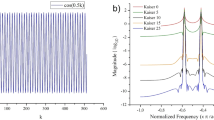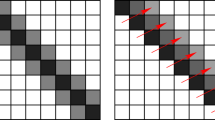Abstract
This paper is concerned with accurate matrix multiplication in floating-point arithmetic. Recently, an accurate summation algorithm was developed by Rump et al. (SIAM J Sci Comput 31(1):189–224, 2008). The key technique of their method is a fast error-free splitting of floating-point numbers. Using this technique, we first develop an error-free transformation of a product of two floating-point matrices into a sum of floating-point matrices. Next, we partially apply this error-free transformation and develop an algorithm which aims to output an accurate approximation of the matrix product. In addition, an a priori error estimate is given. It is a characteristic of the proposed method that in terms of computation as well as in terms of memory consumption, the dominant part of our algorithm is constituted by ordinary floating-point matrix multiplications. The routine for matrix multiplication is highly optimized using BLAS, so that our algorithms show a good computational performance. Although our algorithms require a significant amount of working memory, they are significantly faster than ‘gemmx’ in XBLAS when all sizes of matrices are large enough to realize nearly peak performance of ‘gemm’. Numerical examples illustrate the efficiency of the proposed method.
Similar content being viewed by others
References
IEEE Standard for Floating-Point Arithmetic, Std 754–2008 (2008)
Bailey, D.H.: A Fortran-90 based multiprecision system. ACM Trans. Math. Softw. 21(4), 379–387 (1995)
Dekker, T.J.: A floating-point technique for extending the available precision. Numer. Math. 18(3), 224–242 (1971)
Demmel, J., Hida, Y.: Accurate and efficient floating point summation. SIAM J. Sci. Comput. 25(4), 1214–1248 (2003)
Golub, G.H., Van Loan, C.F.: Matrix Computations, 3rd edn. The Johns Hopkins University Press, Baltimore (1996)
Goto, K., Geijn, R.V.D.: High-performance implementation of the level-3 BLAS. ACM Trans. Math. Softw. 35(1), Article no. 4 (2008)
Li, X., Demmel, J., Bailey, D., Henry, G., Hida, Y., Iskandar, J., Kahan, W., Kang, S., Kapur, A., Martin, M., Thompson, B., Tung, T., Yoo, D.: Design, implementation and testing of extended and mixed precision BLAS. ACM Trans. Math. Softw. 28(2), 152–205 (2002)
Higham, N.J.: Accuracy and Stability of Numerical Algorithms, 2nd edn. SIAM Publications, Philadelphia (2002)
Ogita, T., Rump, S.M., Oishi, S.: Accurate sum and dot product. SIAM J. Sci. Comput. 26, 1955–1988 (2005)
Rump, S.M.: Ultimately fast accurate summation. SIAM J. Sci. Comput. 31(5), 3466–3502 (2009)
Rump, S.M., Ogita, T., Oishi, S.: Accurate floating-point summation part I: faithful rounding. SIAM J. Sci. Comput. 31(1), 189–224 (2008)
Rump, S.M., Ogita, T., Oishi, S.: Accurate floating-point summation part II: sign, K-fold faithful and rounding to nearest. SIAM J. Sci. Comput. 31(2), 1269–1302 (2008)
Whaley, C.R., Petitet, A., Dongarra, J.J.: Automated empirical optimizations of software and the ATLAS project. Parallel Comput. 27, 3–35 (2001)
The MPFR Library: http://www.mpfr.org/. Accessed 7 Feb 2010
exflib—extend precision floating-point arithmetic library: http://www-an.acs.i.kyoto-u.ac.jp/~fujiwara/exflib/exflib-index.html. Accessed 7 Feb 2010
http://www.eecs.berkeley.edu/~yozo/. Accessed 25 Dec 2009
The NIST Sparse BLAS: http://math.nist.gov/spblas/original.html. Accessed 7 Feb 2010
http://www.cise.ufl.edu/research/sparse/umfpack/. Accessed 7 Feb 2010
MATLAB Programming Version 7, The MathWorks (2005)
Rump, S.M.: INTLAB—INTerval LABoratory. In: Csendes, T. (ed.) Developments in Reliable Computing, pp. 77–104. Kluwer Academic, Dordrecht (1999)
Author information
Authors and Affiliations
Corresponding author
Rights and permissions
About this article
Cite this article
Ozaki, K., Ogita, T., Oishi, S. et al. Error-free transformations of matrix multiplication by using fast routines of matrix multiplication and its applications. Numer Algor 59, 95–118 (2012). https://doi.org/10.1007/s11075-011-9478-1
Received:
Accepted:
Published:
Issue Date:
DOI: https://doi.org/10.1007/s11075-011-9478-1




